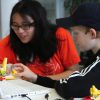It’s Harder Than You Think: Finally, earlier this week I covered a new startup called Codeacademy that has been signing up thousands of people for its Code Year, a free class designed to teach those of us new to computer science how to code via programming lessons sent each week to our inboxes. Its numbers have jumped to over 300,00, and the initiative has gotten tons of attention online.
Yet a few wise souls took a more measured look at the explosion in interest in learning to code, questioning how much all of these people are actually learning from online programs like Codeacademy, and debating how it might make the most sense to teach them.
Over at Hack Education, Audrey Watters has this great take (from back in October, but I’m behind) on her own efforts to learn how to code. As she puts it bluntly, “it’s actually damn hard to learn to code if you have no background in engineering or math. And frankly, Codecademy has been no help.”
Developers can be a hard group to communicate with, and I sometimes find myself thinking: “I wish I could just do this myself. How hard can this be?” This is a good reminder that we need to define what we mean by learning to code, and, most importantly, we need to pay attention to pedagogy.
Julie Meloni, an author of many how-to tech books and the former lead technologist of the online library environment at the University of Virginia, takes up where Watters leaves off and points out that we need more attention to how we teach and how learners learn these new languages. Despite the importance of information and coding literacy, it’s not that easy to make everyone into a coder. Nor should it be.
“Yes, the interface is shiny and the badges are neat, but no, it is not teaching you how to code,” she writes. “It is teaching you how to call-and-response, and is not particularly helpful in explaining why you’re responding, why they’re calling, or—most importantly—how to become a composer.”
Watters says the crucial question is: “’how many of those 500,000 Codecademy users actually learned any JavaScript?’, the answer is actually really important.”
Agreed.
Christine C for MacArthur Foundation and HASTAC(via PLAYBACK: Pedagogy, Coding and Teaching Kids to Think Deeply | Spotlight on Digital Media and Learning)
